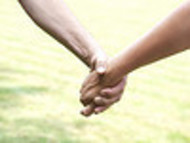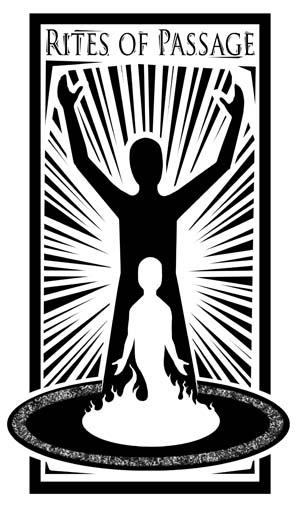Women supporting men supporting men
 Sunday, January 1, 2012 at 5:47PM
Sunday, January 1, 2012 at 5:47PM  RogiroNothing frustrates me more than hearing women deride the work that men do to heal themselves. It’s completely self-defeating.
RogiroNothing frustrates me more than hearing women deride the work that men do to heal themselves. It’s completely self-defeating.
Men need to enroll women into supporting men’s growth work. Men need to help women understand how growing and healing men, how empathizing with and understanding men, better serves them. It in fact serves women and children and other men - all of us.
I served for a year as unpaid Center Director of our Northern California ManKind Project community in 1999. I took a call once from a woman who was concerned about her husband joining our weekend workshop. It was bad enough that the man couldn’t make an empowered decision on his own to do the weekend. He referred his wife to me so I could convince her that it was OK for him to do it. That alone was enough to make him a prime candidate for our work.
But instead of talking with him I spent about a half hour on the phone with his wife. I answered every question she had, addressing her every concern about the weekend. But rather than get relief and grow calmer, she seemed to become more and more agitated. Finally, I realized that she was going to find some reason to object to our work no matter what. Sure enough, after I didn’t satisfy her with my answer to one very specific question, she suddenly started hurling abuse, projecting all sorts of accusations – that I was sexist, misogynistic, and worse. So she finally got to the place she wanted to go to all along: she slammed the phone down in disgust, saying “my husband will never do your weekend!”
Women think they are protecting themselves when they interfere with “men’s work.” But they’re actually making their own lives harder. They’re making themselves and their partners unhappier. And it all comes from fear. My guess is this woman was deep in fear that her husband would come back a changed man in ways that would feel threatening to her. Perhaps he’d no longer love her. Perhaps he’d no longer defer to her.
Why is it a man’s job to educate women about men’s work? Because women have good reason to fear when men go off together. All too often going off together has been an excuse for men to get drunk, go whoring, to prey on the weak. All too often the victims of those gatherings are women themselves, or children, or men of color, or gay men, or men suspected of being gay. All too often men return lesser men than when they left.
But what about when men go off together to teach each other how to become better men? That happens too. It used to be common for every indigenous society to initiate its boys into adulthood. To teach them the rights and responsibilities of adult citizenship. In a sense this was the very fulfillment of the village – to create generativity, to protect the village from future harm from within, to ensure its survival and continuity. The challenge is to make initiations and healing work for men so commonplace that women will implicitly understand and accept it.
In her otherwise brilliant book STIFFED, feminist author Susan Faludi makes the critical mistake of deriding men’s healing work. She reduces men doing their work – going off to the woods together, resurrecting their imprisoned “Wildman,” summoning their “Inner King” – to their most superficial and reductive meanings, to their most juvenile connotations. This is a terrible mistake. But it’s a mistake many women make, not only feminists. Men need to teach women that it’s safe to let these judgments go.
For some reason men’s drumming circles seem to be a common target of derision among women. Why? What’s wrong with a drumming circle? There are few better ways to get men grounded, out of their heads and into their bodies, and out of their isolated sense of self into a common experience of group. It can be a powerfully communal, growthful, even joyful experience.
This was demonstrated to me when I was making a feature film in Iowa some years ago. The morning was going badly. The crew was taking a long time to set up; things were chaotic. I asked my musician friend Johnsie, who was on set that day to help our stars with a choreographed scene, if he’d start drumming. Amazing! Within minutes I could feel the crew grow more synchronous. Stress and dis-ease vanished off faces and I saw smiles. In no time we were quickly prepared and ready to shoot.
Do women fear men drumming together because some primordial impulse kicks? Do they fear there will be violence, that they will be subsequently attacked? Perhaps. Certainly in different cultures around the planet drumming was often a prelude to battle. But may it also be another product of Zero Sum thinking? ie., “If it’s good for men it must be bad for women.”
All the smart women I know, and I know plenty, cherish their men for doing their work. They realize how it makes the women themselves safer, happier, more loved. They realize they need not be threatened. They realize how they will be well served by a man’s growth.
Why? Because a powerful man understands that his life has to be lived at least partly in service to the feminine if he wants to live a life of mission. Protecting the realm, promoting harmony, creating abundance for family, community, nation, usually means at some point serving women and children. It means doing more than just keeping them safe, it means making the necessary sacrifices to promote their well-being and growth. It means helping them thrive. A powerful, mission-driven man understands that.
The paradox is that it takes a cauldron of powerful masculine energy to get a man to that point. It takes men going off in the woods together, it takes men joining each other in exclusive circles of support, it takes drumming circles, it takes, if not “men’s clubs,” then safe places where men can go to be alone with other men. The fact is men need to be taught by men how to be men. And it takes very strong containers to hold a man’s passage. Men will buck and resist, partly because they fear that no container can possibly hold all the grief and rage they carry. But hold it we can and do.
Smart women understand that there are multiple venues and circumstances where men teach other men, and boys, about being men. The more formal ways are mentioned above. But there are plenty of informal ways. Going camping, hiking or hunting, weekend workshops, men’s support groups. Sports can do it. The military can do it. Work can do it. Yes, even a few drinks at a bar with the guys or hanging out in some man-cave can do it.
The proof is always in the pudding. Does the man (or boy) return from the gathering with a wiser, more mature attitude? With a more loving and available heart? With more humor and light? Or does he return angry, closed, protective, resentful, fearful? Or worse, completely drunk or stoned, aggressive, and violent?
A wise woman always recognizes when a man needs to get out and be with other men. He’s getting short with her and kids, he’s not listening anymore, or worse, he’s put his fist through the wall. A wise woman will urge her man to get out. This was beautifully demonstrated to me on a men’s weekend back in 1996. When asked why he was there one man from rural Wisconsin said, “My wife saw how impatient and angry I was getting with her. She told me ‘It’s time for you to go be with the men.’”
So women, when it’s a man’s time to go to be with the men, support him in that choice. And if he doesn’t return a better man for it then it’s time for him to consider joining different men under different circumstances. But it’s important that women support his seeking. Men going off with men to teach each other how to be men is an act that should be honored.
And men, it’s our responsibility to teach the women in our lives the difference between serving our shadow self and serving our growth. Teaching by words and by example. If we prove to them we’re actually doing right by them, getting that support will be much easier. Women can actually be proud when they see their men going off to be with other men. Imagine that! It’s not that hard to make happen.
 feminism,
feminism,  initiation,
initiation,  masulinity,
masulinity,  maturity,
maturity,  men,
men,  men's growth,
men's growth,  men's work,
men's work,  rites of passage,
rites of passage,  women in
women in  Rites of Passage
Rites of Passage 









